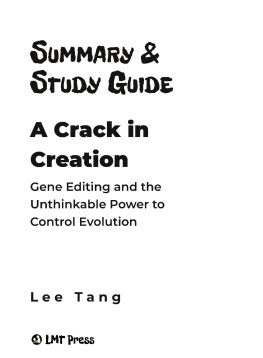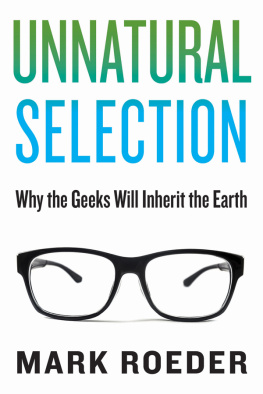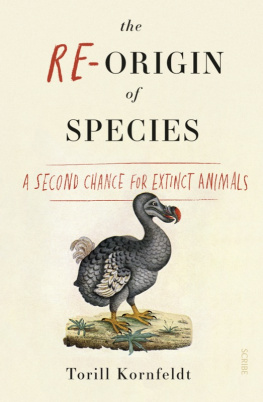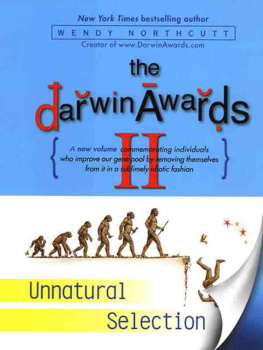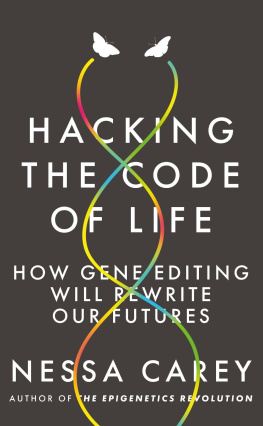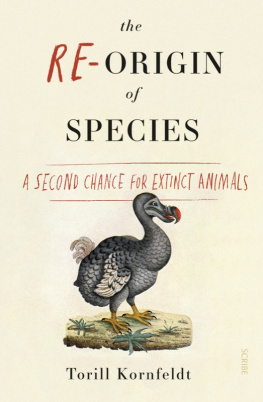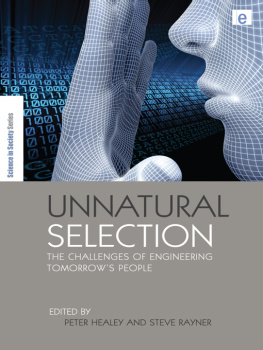TORILL KORNFELDT. - UNNATURAL SELECTION OF OUR SPECIES;AT THE FRONTIER OF GENE EDITING
Here you can read online TORILL KORNFELDT. - UNNATURAL SELECTION OF OUR SPECIES;AT THE FRONTIER OF GENE EDITING full text of the book (entire story) in english for free. Download pdf and epub, get meaning, cover and reviews about this ebook. City: S.l., year: 2021, publisher: HERO, genre: Home and family. Description of the work, (preface) as well as reviews are available. Best literature library LitArk.com created for fans of good reading and offers a wide selection of genres:
Romance novel
Science fiction
Adventure
Detective
Science
History
Home and family
Prose
Art
Politics
Computer
Non-fiction
Religion
Business
Children
Humor
Choose a favorite category and find really read worthwhile books. Enjoy immersion in the world of imagination, feel the emotions of the characters or learn something new for yourself, make an fascinating discovery.
- Book:UNNATURAL SELECTION OF OUR SPECIES;AT THE FRONTIER OF GENE EDITING
- Author:
- Publisher:HERO
- Genre:
- Year:2021
- City:S.l.
- Rating:5 / 5
- Favourites:Add to favourites
- Your mark:
- 100
- 1
- 2
- 3
- 4
- 5
UNNATURAL SELECTION OF OUR SPECIES;AT THE FRONTIER OF GENE EDITING: summary, description and annotation
We offer to read an annotation, description, summary or preface (depends on what the author of the book "UNNATURAL SELECTION OF OUR SPECIES;AT THE FRONTIER OF GENE EDITING" wrote himself). If you haven't found the necessary information about the book — write in the comments, we will try to find it.
UNNATURAL SELECTION OF OUR SPECIES;AT THE FRONTIER OF GENE EDITING — read online for free the complete book (whole text) full work
Below is the text of the book, divided by pages. System saving the place of the last page read, allows you to conveniently read the book "UNNATURAL SELECTION OF OUR SPECIES;AT THE FRONTIER OF GENE EDITING" online for free, without having to search again every time where you left off. Put a bookmark, and you can go to the page where you finished reading at any time.
Font size:
Interval:
Bookmark:


Hero, an imprint of
Legend Times Group Ltd, 51 Gower Street, London, WC1E 6HJ
Torill Kornfeldt 2021
The right of the above author to be identified as the author of this work has been asserted in accordance with the Copyright, Designs and Patents Act 1988. British Library Cataloguing in Publication Data available.
Translation Fiona Graham 2021
First published in Swedish in 2020 by Natur & Kultur
Published by agreement with the Kontext Agency
The cost of this translation was defrayed by a subsidy from the Swedish Arts Council, gratefully acknowledged
Illustrations: Erik Kohlstrm
Cover design: Sophie Burdess
Print ISBN: 978-1-80031-342-2
Ebook ISBN: 978-1-80031-343-9
Set in Times. Printing managed by Jellyfish Solutions Ltd
All rights reserved. No part of this publication may be reproduced, stored in or introduced into a retrieval system,
or transmitted, in any form, or by any means electronic, mechanical, photocopying, recording or otherwise, without the prior permission of the publisher. Any person who commits any unauthorised act in relation to this publication may be liable to criminal prosecution and civil claims for damages.
Torill Kornfeldt is a Swedish science journalist with a background in biology. She has worked in the science department of Swedens leading morning newspaper Dagens Nyheter and at the science branch of the Swedish public service radio. There she created the successful radio show Tekniksafari (Tech Safari) on new technology changing society. Her main focus is on how emerging bioengineering and technology will shape our future.
Fiona Graham has a degree in Modern Languages from Oxford University, and has lived in Kenya, Germany, the Netherlands, Luxembourg, Nicaragua and Belgium. She translates from Spanish, French, Dutch, Swedish and German, and is currently the reviews editor at the Swedish Book Review.
The 2020 Nobel Prize festivities broke with tradition. No banquet in the Blue Hall or dancing in the Golden Hall, no ceremonial presentation of medals by the King of Sweden. Instead, the laureates received their medals and congratulations individually, in many cases from Swedish ambassadors around the world. The festivities are on hold until the pandemic has subsided.
Despite the exceptional circumstances, the two chemistry laureates attracted rather more attention than usual. A Nobel Prize is rarely awarded just a few years after the groundbreaking discovery it honours; in most cases, decades pass before important discoveries have proven their value and conferred the greatest benefit to humankind. Even though the results for which the prize was awarded were only published in 2012, it is already clear that the laureates creation is poised to change the world and us in fundamental ways.
The discovery made by these two scientists, Jennifer Doudna and Emmanuelle Charpentier, is actually quite simple: a chemical device developed by bacteria can be turned into a tool that we humans can use. Yet that tool the gene scissors CRISPR-Cas9 has transformed our potential future.
The new generation of sophisticated, precise and cheap gene technology has opened up infinite opportunities in medicine, opportunities to cure people and improve their lives. Yet these also involve new risks, as well as concerns about how best to use the technology. And this isnt just about the future: new though the technology is, it has already had a major impact. That was why the Nobel Committee decided to award the prize to Doudna and Charpentier as early as 2020.
During the ten years and more that Ive been working in science journalism, I have witnessed rapid advances in what new research enables us to achieve. We now have the capacity to redraw the blueprint of our own species, along with that of all the animals and plants in the world. We can transform our own genetic makeup and design living beings that have never existed before. Some of these developments are described in my previous book, The Re-Origin of Species.
When I started writing about these scientific advances as a news reporter, I realized that the people I met outside my professional circle were still talking about gene technology and gene-editing as if they lay in the distant future, as if the phenomenon of gene-editing in humans were something that might confront their grandchildrens generation if that. Most seemed to dismiss the idea as pure science fiction. Yet many of our wildest dreams and our worst nightmares are already scientific reality, or at least well on the way there. Very few people outside scientific circles seem to be aware of this. There is still little or no public debate on the risks and opportunities the new gene technology presents, although its bound to change our society in many ways.
My aim in writing this book is to depict the rapid developments we are in the midst of and to show their possible consequences. I have tried to sketch these advances while they are happening. To do so, I have made every effort to meet the people in the vanguard of this new field of research. I have interviewed many scientists, as well as patients, activists and parents who want to change their childrens genetic makeup. I have visited commercial clinics that provide gene therapy and seen laboratory animals that have been genetically modified in various ways.
To understand all of this, I needed to travel so that I could see the research and its results in situ. I spent nearly a month in China which is on the way to becoming the world leader in gene technology and took high-speed trains to different parts of the country. In Beijing I met scientists who had edited the DNA of human embryos; in leafy Hangzhou I talked to cancer patients and doctors experimenting with gene technology as a cure for cancer; and in Kunming, the city of eternal spring in Chinas south-west, I visited a centre for research on genetically modified monkeys. And there was much more. This journey also showed me clearly how China is flexing its scientific muscles and gearing up to overtake the United States and Europe. The USSoviet space race has been replaced by a scientific arms race, a gene race. While in Asia, I also met scientists and visited clinics in Japan, South Korea and Hong Kong.
But though China and Asia in general are playing an increasingly important role in scientific progress, developments in this field are not confined to Asia. I visited biohackers in a New York lab who are part of a non-mainstream movement keen to share gene technology with the masses, attended scientific conferences and talked to activists in Boston about who actually gets access to the costly new drugs developed with the help of modern gene technology. I travelled to a fascinating research centre in the countryside just outside Chicago to meet a very special genetically modified pig. This book is a piece of reportage that presents a snapshot of where we are now.
But technology isnt merely a technical matter; its not just about what scientists do in labs or operating theatres. Technical developments must also accommodate us human beings, our society and our culture. And our view of both risks and opportunities is formed by our narratives; technical advances have to be fitted into our view of the world. Just over 200 years ago, an adolescent girl sat in a drawing room near Lake Geneva, writing what was to become one of the worlds most famous books, a novel that paved the way for a whole new genre. That time, just like the present day, was an era of radical change in which rapid scientific advances were transforming the world. Her story of the bold, curious scientist has become iconic.
Font size:
Interval:
Bookmark:
Similar books «UNNATURAL SELECTION OF OUR SPECIES;AT THE FRONTIER OF GENE EDITING»
Look at similar books to UNNATURAL SELECTION OF OUR SPECIES;AT THE FRONTIER OF GENE EDITING. We have selected literature similar in name and meaning in the hope of providing readers with more options to find new, interesting, not yet read works.
Discussion, reviews of the book UNNATURAL SELECTION OF OUR SPECIES;AT THE FRONTIER OF GENE EDITING and just readers' own opinions. Leave your comments, write what you think about the work, its meaning or the main characters. Specify what exactly you liked and what you didn't like, and why you think so.

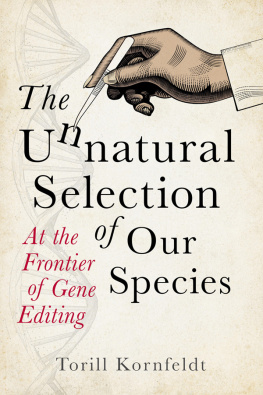
![Tim Lebbon - SNAFU: Unnatural Selection [anthology]](/uploads/posts/book/920220/thumbs/tim-lebbon-snafu-unnatural-selection-anthology.jpg)


